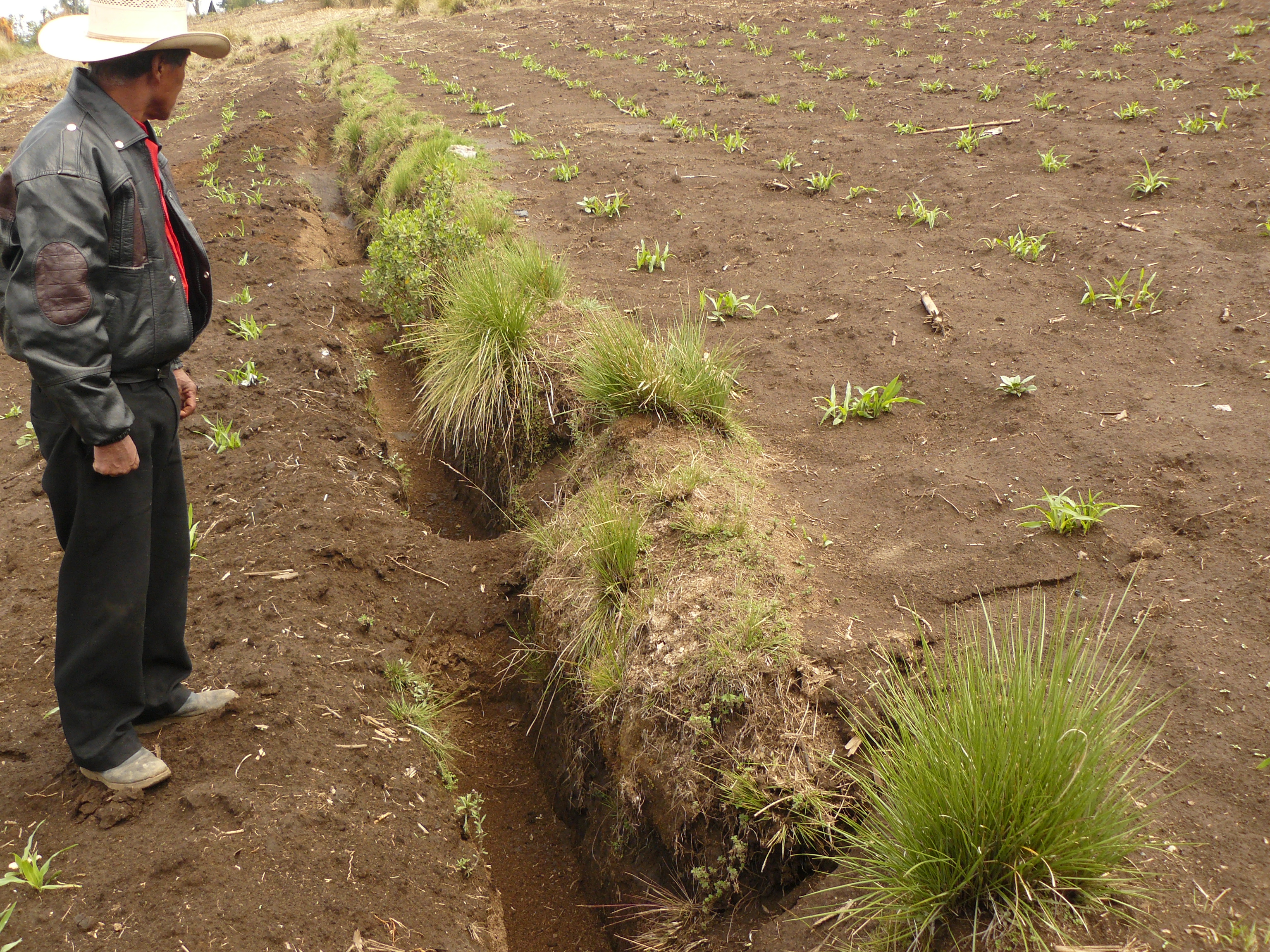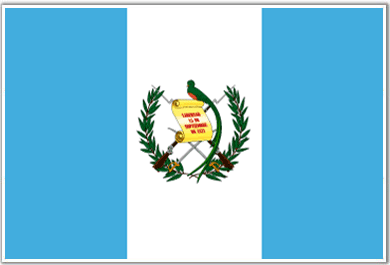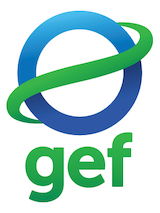CBA Guatemala: Reforestation and Soil Conservation to Improve Tree Nurseries for Adaptation (Grupo Mixto)
Project Overview
Decreased precipitation in Guatemala is having negative effects on local water resources, as well as the people and ecosystems that depend on them. In the village of Piedra del Fuego, natural springs and water resources are not as abundant as they have been previously. This reduces the amount of water available for both household consumption and agricultural use. Cultivation is limited by the lack of irrigation, creating an economic strain on households who must work harder to provide basic food needs. Decreased rainfall has also caused the loss of forested areas. Without plant root systems to secure topsoil, heavy erosion during intense rainfall is an increasingly common problem in winter months.
This Community-Based Adaptation project aimed to reforest degraded areas with tree saplings and improve local agricultural techniques. Improved methods focused on soil conservation and crop intensification. In addition to the planting tree saplings, community tree nurseries and warehouses were built to support continued reforestation activities on degraded land.
Project Details
This project focuses on the indigenous people of the Los Reforestales community, located in the Comitancillo municipality of the Santa Marcos department in western Guatemala. According to the Ministry of Food and Nutritional Security (SESAN), this area is ranked no. 5 with regard to indigenous populations dedicated to grain production for subsistence agriculture (corn and beans) and income-generating agriculture. They also rely on raising bovine and ovine for food and income on a smaller scale. Approximately, 70-80 percent of local production is for the community’s own consumption.
The municipality of Comitancillo has 6,722 acres of land to grow grains, which constitutes 49.5% of the municipal territory. However, this area currently can only be used for forestry, and not for agricultural production due to its degraded state. The ancestral pieces of land that the Los Reforestales community own are in the same non-agricultural conditions. Soil erosion and water scarcity is a main problem in the area due to the non-existence of soil cover to protect against heavy rains and not having enough water infrastructures to save rainwater.
Climate change impacts such as irregular and torrential rains, droughts and increased temperatures exacerbate the conditions in the area. The project sites have increasingly experienced more landslides and mudslides, loss of soil fertility, loss of flora and fauna, extinction of endemic species and water pollution. The community members lack knowledge on climate change and need help in coping with its adverse impacts to ensure food security and protect their land.
This Community-Based Adaptation project aims to strengthen the Les Reforestales community’s resilience to climate change through participatory awareness-raising and capacity-building workshops in sustainable land management and water conservation. Prior to this project, some farmers have used terracing to adapt to climate change impacts. However, there is a great need to transform the thinking and actions of the whole community, so that the local people might act in unity to cope with the climate change impacts that are threatening their ecosystems and livelihoods. Activities such as reforestation, forest nursery management and community forest plantation management using native species (cypress and alder) will be implemented through the project. The use of organic fertilizers will be introduced, and activities to lessen soil erosion, prevent landslides and increase the soil fertility will be taught and practiced in demonstrations and trainings. Additionally, rotational grazing for sheep and cattle will be better managed to lessen the soil erosion and improved galleys are built for effective water conservation.
All training workshops and activities are interactive, and the needs of all community members, regardless of gender, age and physical and mental abilities, are addressed. More than 1000 volunteers, in the neighboring communities, are anticipated to be reached throughout the project cycle.
Key Results and Outputs
Project Objective: Contribute to the community land "La Florida" as an alternative climate change adaptation, minimizing cattle grazing pressures on the lower montane wet forest ecosystem. This project will be used as a case study.
Outcome 1.0: Improved Twenty galleys established for sheep and cattle on a smaller scale to prevent soil depletion and destruction of flora by trampling.
Output 1.1: A construction training improved galley
Output 1.2: Construction of 24 galleys improved
Output 1.3: Improved galleys Community Management.
Outcome 2.0: 24 composting organic manure made from sheep and cattle feedlot improving soil fertility.
Output 2.1: A training on the development of composting to obtain organic products
Output 2.2: Development of a compost per household to obtain products for structure and improve soil quality.
Output 2.3: Management of organic composting
Outcome 3.0: Soil conservation measures at 1.06 acres that minimize the impact of climate change effect preventing erosion, landslides and loss of fertility.
Output 3.1: A Soil Conservation training.
Output 3.2: Implementation of soil conservation measures.
Output 3.3: Maintenance of soil conservation structures.
Outcome 4.0: 1.5 hectares reforested in different parts of the community with 4, 000 saplings of native species produced. Cupressus(cypress) and agnus sp. (alder)
Output 4.1: Management and maintenance of the forest nursery
Output 4.2: 2 trainings on: a) forest nursery management b) reforestation and community forest plantation management.
Output 4.4: Reforestation tree species produced for the recovery of degraded areas
Output 4.5: Maintenance of reforested areas.
Outcome 5.0: A training process has been developed to assist in capacity building and knowledge of women and men in the group.
Output 5.1: Workshops: Climate change, administration and finance, community organizing, domestic violence, two adaptive, risk management.
Reports and Publications
Project Brief / Fact Sheet
CBA Guatemala - Grupo Mixto Los Reforestales - Fast Facts
PIFs
Monitoring and Evaluation
Monitoring and evaluation for community-based adaptation is a new field, and the CBA project is piloting innovative approaches to evaluating the success of locally-driven adaptation projects, and generating lessons to inform ongoing practice.
Key considerations in M&E for CBA include:
- Grounding M&E in the local context: M&E for CBA should avoid overly rigid frameworks, recognizing community heterogeneity and maintaining local relevance
- Capturing global lessons from local projects: CBA projects are highly contextualized, but lessons generated should be relevant to stakeholders globally
- Incorporation of both quantitative and qualitative indicators: to ground projects in tangible changes that can be objectively evaluated, and to capture lessons and case studies for global dissemination
To these ends, the CBA project uses three indicator systems: the Vulnerability Reduction Assessment, the Small Grants Programme Impact Assessment System, and the UNDP Climate Change Adaptation Indicator Framework.
The Vulnerability Reduction Assessment (VRA)
The VRA is a question-based approach with the following aims:
- To make M&E responsive to community priorities
- To use M&E to make projects more accountable to local priorities
- To make M&E capture community ideas and local knowledge
- To gather community-level feedback to guide ongoing project management
- To generate qualitative information
- To capture lessons on specific issues within community-based adaptation
- To generate case studies highlighting adaptation projects
The VRA follows UNDP's Adaptation Policy Framework, and is measured in a series of meetings with local community stakeholders. In these meetings, locally-tailored questions based on standard VRA questions/indicators are posed, and the community assigns a numerical score on a 1-10 scale for each question. Progress is evaluated through changes in scores over the course of implementation, as well as through qualitative data collected in community discussions surrounding the exercise.
UNDP has developed a Users Guide to the VRA (Espanol) (Francais) as a tool to assist practitioners to conceptualize and execute VRA measurements in the context of CBA projects.
The SGP Impact Assessment System (IAS)
The CBA, being a project of the GEF Strategic Priority on Adaptation, aims to increase the resilience of ecosystems and communities to the impacts of climate change, generating global environmental benefits, and increasing their resilience in the face of climate change impacts. To this end, the CBA projects use the SGP's impact assessment system for monitoring achievements in GEF focal areas (focusing primarily on biodiversity and sustainable land management).
The IAS is composed of a number of quantitative indicators which track biophysical ecosystem indicators, as well as policy impact, capacity development and awareness-building.
UNDP Climate Change Adaptation Indicator Framework
CBA projects also track quantitative indicators from UNDP's adaptation indicator framework, corresponding to the thematic area on natural resources management. More information on UNDP's indicator framework can be found on the UNDP climate change adaptation monitoring and evaluation website.
* This description applies to all projects implemented through UNDP's Community-Based Adaptation programme. Specific details on this project's M&E will be included here as they become available. *










